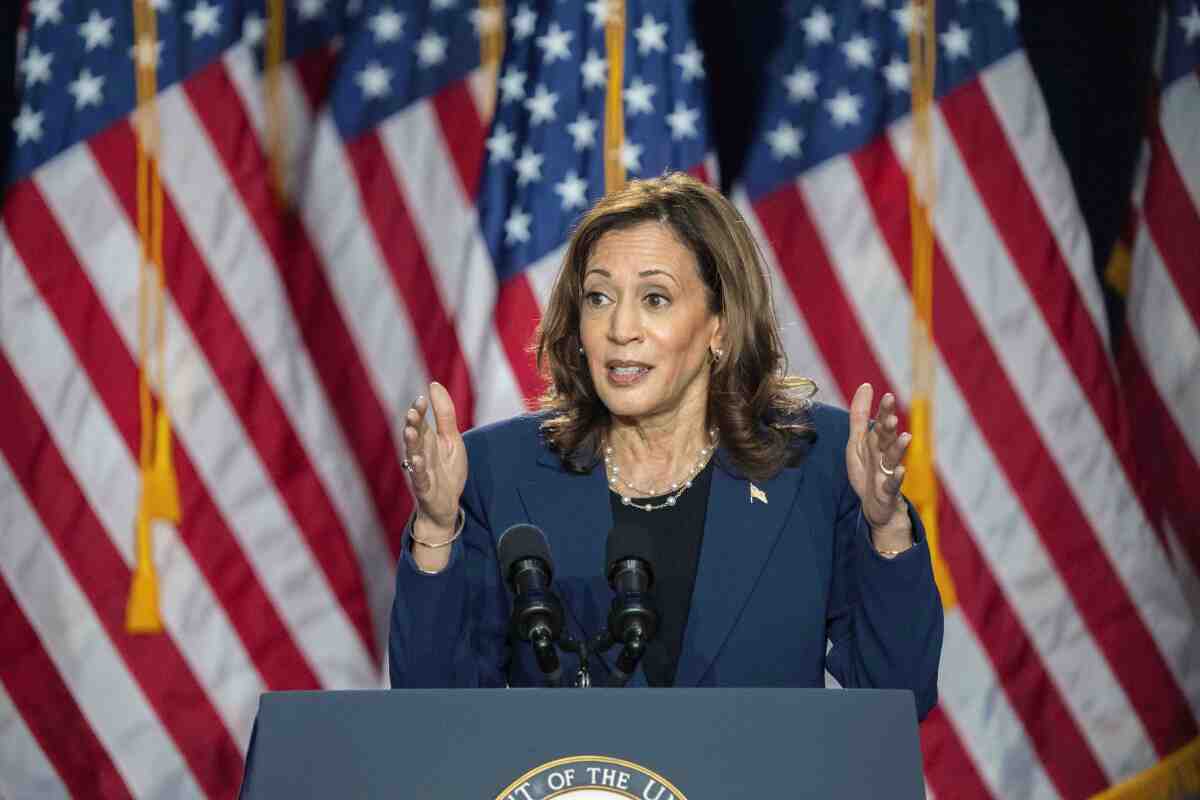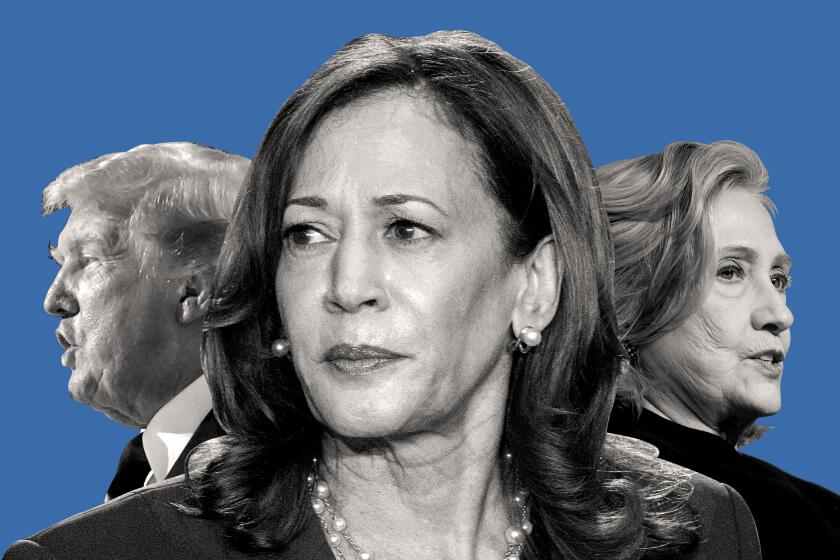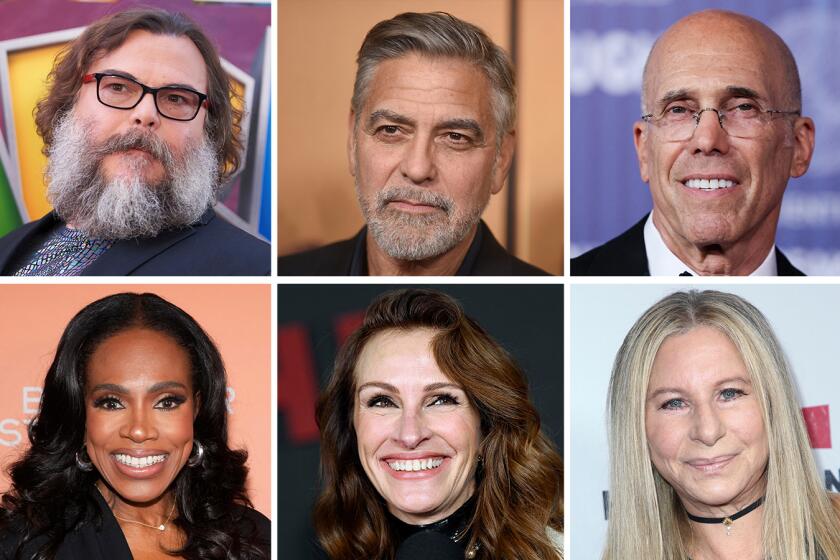Astronaut? Governor? Cabinet member? Assessing Harris’ VP options

- Share via
As Vice President Kamala Harris consolidates support among Democrats to become the party’s 2024 presidential nominee, a key question dominates the political conversation: Who would be her running mate?
There is widespread consensus that Harris, of Jamaican and Indian descent, would pick a straight, white man — a strategic move in a nation that has never elected a woman, much less a woman of color, as its leader.
Among the elected officials reportedly in contention are Govs. Josh Shapiro of Pennsylvania, Roy Cooper of North Carolina, and Andy Beshear of Kentucky, as well as Arizona Sen. Mark Kelly.
Some have mentioned the prospect of Harris selecting California Gov. Gavin Newsom as her No. 2, but the 12th Amendment of the Constitution prohibits running mates from residing in the same state. And the imagery of two leaders whose political careers were forged in San Francisco would provide unending fodder for conservatives who have long used the city as shorthand for liberal policies leading to dysfunction and disaster.
The timeline for Harris to make her selection is short — the Democratic National Convention begins in less than four weeks in Chicago. The strategic calculation for her pick is also different than in traditional presidential campaigns, when candidates often select a running mate to shore up weaknesses in their resumes.
Dueling narratives on Kamala Harris reflect a unique election: She’s poised to be the first woman of color to top a major-party ticket, and Trump is the first convicted felon to do so.
In 2008, Democrat Barack Obama — a relatively inexperienced senator from Illinois — chose Joe Biden because of the veteran Delaware senator’s foreign policy chops. In the same contest, then-Sen. John McCain of Arizona chose Alaska Gov. Sarah Palin in an effort to appeal to women and the non-establishment wing of the GOP, and place a younger politician on the ticket.
But President Biden’s announcement Sunday that he would not seek reelection has thrown historical electoral norms out the window and created an unprecedented moment in American politics.
“Sometimes people think about these picks as a way to unify the party and its different wings,” said Thad Kousser, a political science professor at UC San Diego. “I don’t think there are any wings of the [Democratic] Party right now other than the beating-Donald-Trump wing. I think the choice will be all about electability.”
Each of the men mentioned as the top possible ticket mates offers potential upsides — as well as liabilities.
Shapiro, viewed as a top contender, is the governor of a state that is crucial to Democrats’ path to winning the White House. Though he has been Pennsylvania’s chief executive for less than two years, the 51-year-old is regarded as a skilled orator and a politician who seeks out bipartisan consensus.
On Tuesday, Shapiro told reporters he had not been asked to submit vetting documents to Harris’ campaign.
“The vice president should make that decision free from any political pressure,” he said, according to the CBS affiliate in Philadelphia. “It’s her decision to make. She’ll make it on the timeline that she so chooses.”
Some political observers have questioned whether having Shapiro, who is Jewish, on the ticket could harm Harris’ chances of winning in the crucial swing state of Michigan, which has a significant number of Muslim American voters, as well as among progressive voters who have been critical of Democrats’ approach to the Israel-Hamas conflict.
Shapiro is a strong supporter of Israel but has been critical of Prime Minister Benjamin Netanyahu’s leadership, even before Hamas’ Oct. 7 attack on the country.
Harris’ husband, Doug Emhoff, a Los Angeles-based entertainment attorney, is also Jewish, so some argue that voters who are concerned about Harris’ views on the war are already unlikely to vote for her.
Kelly — a former astronaut and the husband of Gabrielle Giffords, a former House member who was gravely wounded in an assassination attempt in 2011 — is also viewed as a top prospect to be Harris’ running mate. Arizona, once a reliably Republican state, is now a battleground that narrowly supported Biden over Trump in 2020 but backed Trump over Hillary Clinton in 2016.
The day after Biden’s disastrous June debate with Trump, which prompted a drumbeat of calls for the president to end his reelection bid, Harris appeared with Kelly in Las Vegas — in the battleground state of Nevada — and lauded his service to the nation.
Kelly focused on the Western states’ similarities, notably their Latino populations.
Nevada and Arizona “are going to play a very large part in the role of determining the direction of this country,” Kelly said, according to the Arizona Republic. “So, that’s why I’m here. Because Nevada, Arizona and our country face a choice, a choice between continuing the progress we are making or going backwards.”
Kelly also faces obstacles, including Democratic concerns about holding onto a Senate seat in a state that appears to be leaning increasingly to the right at a time when the chamber is narrowly divided.
Additionally, labor leaders who have largely lined up behind Harris’ candidacy are alarmed by Kelly’s lack of support for the Protecting the Right to Organize Act, federal legislation that would expand unions’ ability to organize and collectively bargain, weaken states’ “right-to-work” laws and otherwise empower labor. On Wednesday, Kelly told the Huffington Post that he supports the legislation.
Cooper of North Carolina and Beshear of Kentucky are not from states that are likely to back Harris in the November election, but they are governors who have shown an ability to win conservative voters. If Harris were to select either of them, it may be viewed as an effort to appeal to moderate voters who could be pivotal in swing states in the November election.
Harris is close with Cooper from their days as attorneys general in their respective states. And while North Carolina is viewed as a GOP state, the former Sunday school teacher has repeatedly won statewide elections there.
George Clooney, Netflix co-founder Reed Hastings and other Hollywood heavyweights, who pressured President Biden to not seek reelection, have rallied behind the campaign of Vice President Kamala Harris.
Cooper has demurred when asked whether he would seek to be Harris’ running mate.
“I appreciate people talking about me,” he said Monday on MSNBC. “But I think the focus right now needs to be on [Harris] this week.”
Beshear has also proved his ability to appeal to GOP voters, and his critique of Trump’s vice presidential nominee — Ohio Sen. J.D. Vance, who has played up his Appalachian roots and family ties to Kentucky — has been blistering.
“He ain’t from here,” Beshear told the Associated Press this week.
Vance’s political career was founded on his 2016 book, “Hillbilly Elegy,” a bestseller that some argue captured the struggles of rural Americans while others counter that it was grounded in stereotypical tropes that failed to note the historic exploitation of Appalachians.
“You don’t get to just come in eastern Kentucky a couple of times in the summer and then maybe for weddings and a funeral and cast judgment on us,” Beshear said Monday. “It’s offensive.”
Asked whether he wanted to become Harris’ running mate, the Kentucky governor didn’t directly respond, saying that he planned to serve the rest of his term.
“The only way that wouldn’t happen is if I have an opportunity to help Kentuckians in a different way that would bring additional value,” he said.
These names are among roughly a dozen that are being considered, according to a CBS news report on Wednesday. Others reportedly being eyed are Govs. J.B. Pritzker of Illinois, Gretchen Whitmer of Michigan and Tim Walz of Minnesota, as well as Biden Cabinet members Gina Raimondo, the secretary of Commerce, and Pete Buttigieg, the secretary of Transportation.
Some liberal strategists urged Harris to be bold and dispense with the conventional wisdom that it would be politically unwise to select a woman, a person of color or someone from the LGBTQ+ community.
“It is time that we think outside of the box that we have allowed to define what makes a winning presidential ticket. The traditional, straight Christian white man as the epitome of American leadership can no longer be the default,” LaTosha Brown, the co-founder of Black Voters Matter, said in a statement.
“Straight white men have never been able to save this nation by themselves. While they have been the face of political leadership for decades, America has never moved forward without the prodding, pushing and creative leadership of a diverse group of Americans, particularly women and communities of color,” Brown said. “Our nominees should reflect this truth.”
More to Read
Get the L.A. Times Politics newsletter
Deeply reported insights into legislation, politics and policy from Sacramento, Washington and beyond. In your inbox twice per week.
You may occasionally receive promotional content from the Los Angeles Times.













